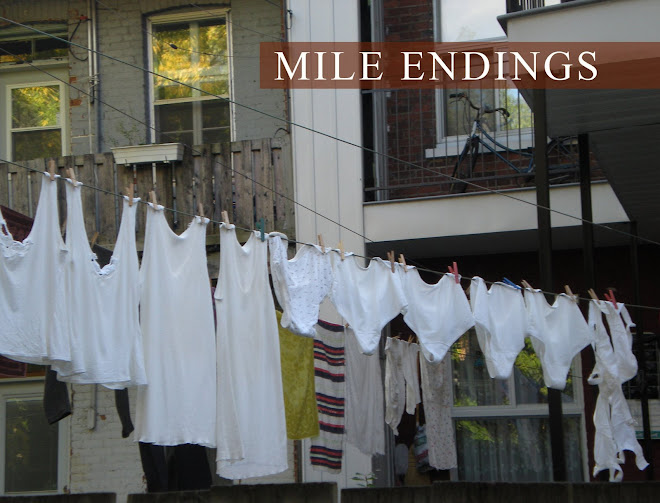
When Kathryn Jezer-Morton put up a beehive in a vacant lot (aka le Champs des Possibles) she wasn't sure what would happen.
She surrounded the hive with a small chicken wire fence and posted a sign introducing the hive's inhabitants as "peaceful, hardworking bees" with a caveat: "If you disturb them, they will sting you." For more information she provided an email address: mileendbeehive at gmail.com.
"I wanted an address without my name in it, in case of fines from the city," she laughs.
"My husband and I weren't sure how it would go. We thought, 'it's not on our property; it's a liability; people will get stung; vandalism will occur; it'll be removed by the city. But let's do it!' We put the little fence around it to deter dogs and night-time tagger kids."
After they set it up, Jezer-Morton worried about the hive getting damaged and about passersby getting stung. That night she couldn't sleep.
"Then I got a bunch of email – all from people who wanted to help!" she recounts.
"There was a bit of vandalism, people stole a few fence stakes. But I realized a hive is pretty much a self-protecting thing."

Walking down St. Viateur, Jezer-Morton manages to look light on her feet, even glamourous, at 40 weeks pregnant. She's on maternity leave from her job as an editor at an online men's magazine that she describes as "laddish" – nothing to do with nature.
It's a little hard to believe she's a beekeeper. Except she must be, because she says things like: "Working with bees is so calming. You have to be calm so they'll be calm."
Her grandfather kept bees in Maine, and she grew interested in keeping her own when colony collapse disorder first appeared in the news. She was living and volunteering in New Orleans where there was a post-Katrina renaissance in urban agriculture.
After moving back to her native Montreal and taking a beekeeping course in Mirabel, it made sense to find a spot for her hive near her apartment.
Two days past her due date, Jezer-Morton traipses through the hot field. She puts on her long sleeved gear and her bee veil and, in a move that seems like it might be one quick way of triggering labour, she opens up the hive.
She says she hasn't been stung once all summer, even though bees repeatedly got tangled in her long hair as she walked away from the hive and took off her bee veil.
In the shade of a factory building, in front of a wall covered in graffiti, her hive is filling up with honey. The bees have been working.
"I'm so excited this has worked out," she says. "Bees in a vacant lot. It's utopian!"

A few blocks away, not far from the railroad tracks, three more urban beehives are thrumming with activity.
Francis Miquet has been keeping bees in Mile End for five years, and first started beekeeping 15 years ago when he apprenticed with a beekeeper in Papineauville.
Since I happen to live with this particular beekeeper, I'm used to stepping around his box of bee stuff, the smoker, the scraper, the bee suit, and the extra empty hives. I admit, he's the one responsible for any preconceived notions I had about Mile End beekeepers (big hands with fingernails banged up and dirty; an old station wagon for hauling hives; a kitchen sticky in the fall from honey extraction).

I personally didn't used to believe it was a great idea to have a beehive in a neighbourhood packed with row houses and pavement and kids and only tiny gardens.
But I found out that cities are full of advantages for bees. They have a wider variety of trees and flowers than rural areas which are often dominated by one kind of crop and treated with pesticides. Bees can do well in a city as crowded and polluted as Paris and even manage to produce untainted honey.
I was also persuaded that honey bees are not aggressive and, unless you open up their hive, rarely sting. Unlike the wasps they're often confused with, bees aren't interested in people's food, or people.
People though, are definitely interested in bees. Due to popular demand, Projet Montreal is planning a pilot project for several Plateau beehives. Like keeping chickens, it's a form of urban farming that's capturing the imagination of city-dwellers all over the place.

At the edge of the vacant lot, Jezer-Morton's hive attracts spectators.
"We'd noticed honey bees in our garden and wondered where they came from," says Julia from nearby St. Dominique Street as she watches the action.
If you look, you may see them, too: bees on the job, they've been criss-crossing gardens of the neighbourhood, visiting the pear trees on Esplanade, the ferny plumes of cosmos on Waverly, and the Queen Anne's lace and clover along the railroad tracks.
see my other story on city bees, here.



